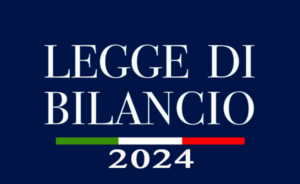I am rushing this E-zine out to you after travelling for the last 2 weeks, because there are some important developments in La Legge di Bilancio 2024 which may affect you.
Tax changes in Italy
By Gareth Horsfall
This article is published on: 29th October 2023
Not since 2014 and the new tax laws introduced by Mario Monti have I seen such big changes in the tax system in Italy. Georgia Meloni’s government have clearly taken a leaf from that book and have introduced a raft of new tax law changes which have recently been announced in La Legge di Bilancio 2024. (These have not been passed yet, but it is highly likely that they will be voted on before year end!).
THE MOST IMPORTANT OF WHICH, FOR MY CLIENTS, IS AN INCREASE ON THE WEALTH TAX ON OVERSEAS PROPERTY!!!
Below I explain a few of the changes and which groups of people they might affect.
“Those who plan do better than those who do not plan, even should they rarely stick to their plan!”

1. Wealth tax on overseas property will increase from 0.76% to 1.06%.pa
On an average overseas property taxable value of GBP300,000 or USD300,000, the tax will rise by 900 a year!
2. Affitti Brevi – cedolare secca – tax to increase from 21% to 26%
If you rent out a property in Italy for short terms rentals (less than 30 days), and you are not registered as a company, then you have the option of applying the ‘cedolare secca’, which is a sort of preferential forfeit rate of tax (expenses non deductible) of 21%. This will rise to 26% from January 2024.
3. Proposed Tax Band changes for 2024
| 2023 | |
|---|---|
| €0 - €15,000 | 23% |
| €15,000 - €50,000 | 27% |
| €50,000 + | 43% |
| 2024 | |
| €0 - €28,000 | 23% |
| €28,000 - €50,000 | 35% |
| €50,000 + | 43% |
4. Non-EU citizens resident in Italy! will have to pay an annual contribution of €2000 to access the Italian health service.
(The contribution will not have to be paid for foreign students with a permesso di soggiorno or similar)
This is a huge development, because any non-EU citizen resident in Italy (US persons and now Brit’s) who is currently paying for access to the Italian health service is assessed based on a certain level of ‘reddito complessivo’ (total income).
You can access that info from the Minstero della Salute website on the link below:
https://www.salute.gov.it/imgs/C_17_pagineAree_2522_listaFile_itemName_0_file.pdf
If you are a non-EU citizen living in Italy, and maybe paying the minimum of €387,34 a year, then this could be a significant rise of nearly €1600 a year!
(Interestingly if you have a high income level and are assessed on the maximum under the current criteria, then €2000 a year would be a quite sizeable discount – assuming the reddito complessivo calculation is no longer valid).
Here are the categories of people who would need to pay.
1. Students or equivalent who are in Italy for a period of less than 3 months.
2. Holders of the permesso di soggiorno for ‘residenza elettiva‘ !!! who don’t have any form of work.
3. Persons of religious institutions.
4. Diplomatic and consular personnel of foreign representations in Italy. (excluding staff with an Italian work contract)
5. Employees of International organisations operating in Italy. (presumably United Nations et al)
6. Foreigners who work for International organisations operating in Italy. (not on Italian contracts)
7. Foreigners who participate in voluntary programmes
8. Parents, over 65 years old, who have or will move to Italy to be with family members, after 5th November 2008.
9. All other excluded categories.
*** Notable is the category of anyone applying for ‘residenza elettiva’. This will affect alot of UK and US citizens who may currently be applying to become resident in Italy under the residenza elettiva category.***

*****Interesting exclusion from the list. *****
One notable category of people missing from the list is Brit’s who were registered in Italy before Brexit and therefore have acquired EU rights as per the EU/UK withdrawal agreement, also retired Brit’s with the right to reciprocal healthcare in Italy under the S1 arrangement. It remains to be seen whether they would be expected to pay or not. (I would think not!) My suspicion is that no one has even thought about this category of individuals and so, like many pieces of Italian legislation, it is first introduced then clarified over time. My thinking is that this one will have to be taken up by the British Embassy and the remaining UK citizen rights lobby groups, for clarification.

And lastly……………………..
Changes to the meaning of residence and domicile!!
(very important for anyone who has residenza in Italy but is claiming ‘fiscal’ residency in another country)
The new text relating to the definition of residency and domicile is as follows:
“Il comma 2 dell’articolo 2 del Testo Unico delle Imposte sui redditi, approvato con decreto del Presidente della Repubblica del 22 dicembre 1986, n. 917 è sostituito dal seguente: “2. Ai fini delle imposte sui redditi si considerano residenti le persone che per la maggior parte del periodo d’imposta, considerando anche le frazioni di giorno, hanno il domicilio o la residenza nel territorio dello Stato ovvero che sono ivi presenti. Ai fini dell’applicazione della presente disposizione, per domicilio si intende il luogo in cui si sviluppano, in via principale, le relazioni personali e familiari della persona. Salvo prova contraria, si presumono altresì residenti le persone iscritte per la maggior parte del periodo di imposta nelle anagrafi della popolazione residente.”
Let’s anlayse the important differences below:
1. Change in the definition of domicile:
In Italian law it currently reads as:
“the place of your principal place of work or interests”
The new definition will be connected to your personal status and read as follows:
“the place where the person’s personal and family relationships mainly develop”
This could be significant for anyone who previously may have claimed working abroad as a criteria for not being resident, whilst their main family relationships were still in Italy.
2. Fractions of days.
If you are someone who has to count your days in and out of the country to maintain non-residency or residency alike, then you will likely need to count fractional days in Italy as well. i.e any time spent in the country in any one day will be counted as a full day for residency purposes.
3. Assumed residenza for anyone registered at the anagrafe for the majority of the fiscal period (calendar year)
Again, this is an important development for anyone who is registered as resident at the anagrafe, has a carta d’identità and certificati di residenza, but is claiming fiscal residency in another tax jurisdiction.
It is clear from these changes that the Italian government is tightening up the rules around residenza and closing those loopholes which many people have used to get around ‘residenza fiscale’ whilst retaining the benefits of being registered as a resident in the anagrafe,
I have been banging on that drum for a long time now. If you are registered as a resident in Italy for the majority of the calendar year then by definition you are also considered fiscally resident as well. Whilst the definitions allowed for people to get around the law, it seems that this will become much harder.
How all this will be put into action is anyone’s guess, but it might be prudent to think that once the laws are refined, then the authorities can use existing information to further investigate matters that have already come to their attention but they have been unable to act on due to the loopholes in the system.
Therefore, the advice is simple:
If you think that anything above might affect you then do some financial planning before it is too late!


